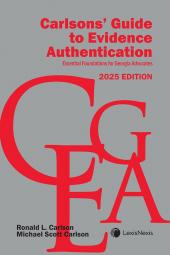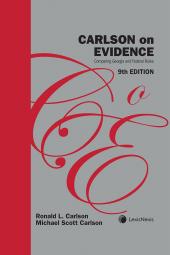Carlsons' Guide to Evidence Authentication: Essential Foundations for Georgia Advocates
Select a format
 International Order Inquiry
International Order Inquiry
Select subscription type
Terms & conditions
Subscribers receive the product(s) listed on the Order Form and any Updates made available during the annual subscription period. Shipping and handling fees are not included in the annual price.
Subscribers are advised of the number of Updates that were made to the particular publication the prior year. The number of Updates may vary due to developments in the law and other publishing issues, but subscribers may use this as a rough estimate of future shipments. Subscribers may call Customer Support at 800-833-9844 for additional information.
Subscribers may cancel this subscription by: calling Customer Support at 800-833-9844; emailing customer.support@lexisnexis.com; or returning the invoice marked "CANCEL".
If subscribers cancel within 30 days after the product is ordered or received and return the product at their expense, then they will receive a full credit of the price for the annual subscription.
If subscribers cancel between 31 and 60 days after the invoice date and return the product at their expense, then they will receive a 5/6th credit of the price for the annual subscription. No credit will be given for cancellations more than 60 days after the invoice date. To receive any credit, subscriber must return all product(s) shipped during the year at their expense within the applicable cancellation period listed above.
The total price includes the product(s) listed in the Order Form and any Updates for a limited period (minimum period of 30 days) after the order is placed ("Order Window"). Shipping and handling fees are not included in the grand total price.
All shipments may be returned, at subscribers' expense, for full credit of the Price within 30 days of receipt.
Shipments may not be returned, and no credits will be issued, more than 30 days after receipt.
After the Order Window, subscribers will receive notice of Updates along with the then-current grand total price and order process as Updates become available. Subscribers will only be shipped those Updates they specifically request.
Product description
View a sample of this title using the ReadNow feature
This publication is targeted to Georgia lawyers and judges. It is of particular use by Georgia attorneys who are commanded by state appellate court decisions to consult federal decisions along with Georgia cases under Georgia's "new" Evidence Code when arguing evidentiary principles. The book provides critical information for resolving evidence disputes in Georgia's trial and appellate courts.
Carlsons’ Guide to Evidence Authentication is designed to go to court. The smaller counterpart to Carlson on Evidence features alphabetical organization, structure by key evidence terms, sample evidentiary foundations, and “Q&A’s”- for a host of evidence. It focuses on succinct analysis of crucial evidence concepts in “new” Georgia and Eleventh Circuit authority.
The previous edition's ISBN is 9781663369345.
eBooks, CDs, downloadable content, and software purchases are noncancelable, nonrefundable and nonreturnable. Click here for more information about LexisNexis eBooks. The eBook versions of this title may feature links to Lexis+® for further legal research options. A valid subscription to Lexis+® is required to access this content.
Table of contents
Chapter 1: Admissions
Chapter 2: Adoptive Admissions
Chapter 3: Agent Admissions
Chapter 4: Best and Secondary Evidence
Chapter 5: Bias
Chapter 6: Business Records
Chapter 7: Character and Reputation: Truthfulness
Chapter 8: Character and Reputation: Violence and Peacefulness
Chapter 9: Coconspirator Statements
Chapter 10: Computer Records and Electronic Evidence
Chapter 11: Confessions
Chapter 12: Custody of Exhibits
Chapter 13: Declarations Against Interest
Chapter 14: Dying Declarations
Chapter 15: Excited Utterance
Chapter 16: Experiments and Demonstrations
Chapter 17: Fees Paid to Experts
Chapter 18: Habit or Custom
Chapter 19: Handwriting
Chapter 20: Impeaching Own Witness
Chapter 21: Insurance Information
Chapter 22: Judicial Notice
Chapter 23: Juror Misconduct
Chapter 24: Motions in Limine
Chapter 25: Offer of Compromise
Chapter 26: Offer of Proof
Chapter 27: Opinion by Lay Witness
Chapter 28: Opinions by Experts
Chapter 29: Photographs
Chapter 30: Present Sense Impression
Chapter 31: Prior Consistent Statements
Chapter 32: Prior Convictions
Chapter 33: Prior Impeaching Statements
Chapter 34: Privileges
Chapter 35: Public Records
Chapter 36: Qualifications of Experts
Chapter 37: Remedial Measures
Chapter 38: Sequestration Violation
Chapter 39: State of Mind
Chapter 40: Statements to Doctors and Medical Personnel: Medical History
Chapter 41: Summaries
Chapter 42: Texts and Treatises
Chapter 43: Uncharged Misconduct
Chapter 44: Untruthful Acts Impeachment
Chapter 45: Voice
Appendix: Georgia Rules of Evidence
 Lexis Nexis
Lexis Nexis 
